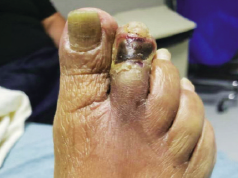
A new secondary analysis of sex disparities in the best endovascular versus best surgical therapy in patients with critical limb ischemia (BEST-CLI) trial data has found that improved major adverse limb event (MALE)-free survival via open surgical bypass with single segment greater saphenous vein (SSGSV) available, is generalizable to female patients.
Ahead of delivering the analysis during Plenary Session 3 (Thursday, June 20, 8–9:30 a.m., in the West Building, Level 3, Skyline Ballroom), Katharine L. McGinigle, MD, associate professor at the University of North Carolina at Chapel Hill, North Carolina, tells VS@VAM of the sex-based, biologic differences in atherosclerosis development which have led to variances in revascularization procedures offered to females.
“In retrospective studies, females have inferior short- and long-term outcomes after intralingual revascularization compared to males. Few randomized controlled trials report sex-stratified results, but this is important to do in order to understand what results can actually be expected in females,” McGinigle explains.
“Despite clear biologic differences, the efficacy of new medications, endovascular devices and other outcomes are rarely tested in females specifically.
“This is much like the common but flawed assumption that non-Hispanic White males are the default standard and that results are generalizable to other populations,” McGingle added.
Looking at the BEST-CLI data, McGinigle and colleagues identify that, regardless of revascularization modality, females had better amputation-free survival at one year when compared to male patients. However, improved MALE-free survival with surgical bypass in female patients suggests a surgery-first approach should be considered primarily, regardless of conduit availability, she adds.












